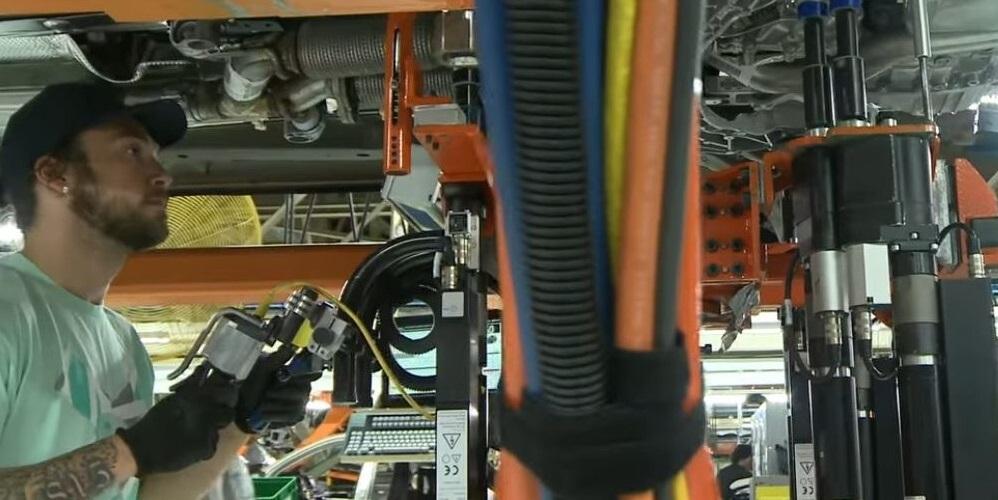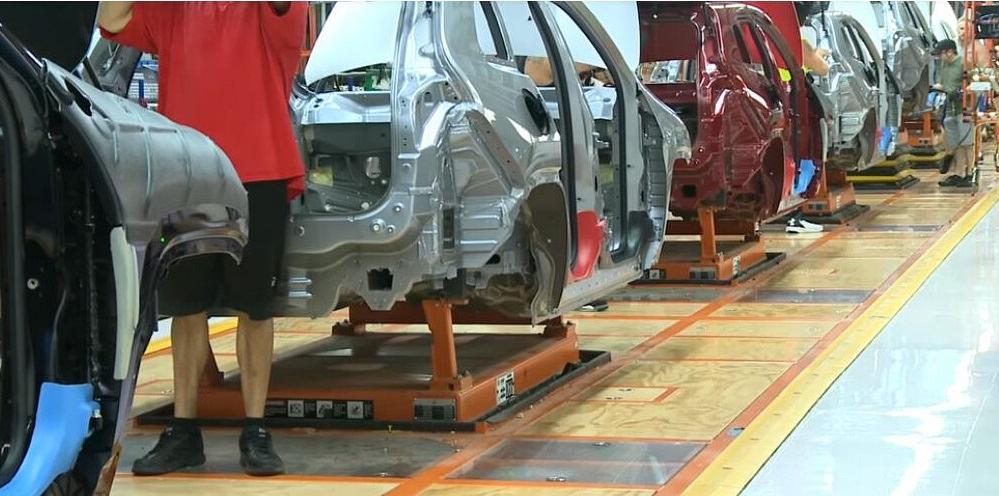Contributing editor
- FMA
- The Fabricator
- FABTECH
- Canadian Metalworking
Categories
- Additive Manufacturing
- Aluminum Welding
- Arc Welding
- Assembly and Joining
- Automation and Robotics
- Bending and Forming
- Consumables
- Cutting and Weld Prep
- Electric Vehicles
- En Español
- Finishing
- Hydroforming
- Laser Cutting
- Laser Welding
- Machining
- Manufacturing Software
- Materials Handling
- Metals/Materials
- Oxyfuel Cutting
- Plasma Cutting
- Power Tools
- Punching and Other Holemaking
- Roll Forming
- Safety
- Sawing
- Shearing
- Shop Management
- Testing and Measuring
- Tube and Pipe Fabrication
- Tube and Pipe Production
- Waterjet Cutting
Industry Directory
Webcasts
Podcasts
FAB 40
Advertise
Subscribe
Account Login
Search
Trade war, tariffs ironies hit home with FCA layoffs
Jeep Cherokee’s booming sales can’t halt effects of sluggish China economy
- By Kate Bachman
- April 29, 2019

A Fiat Chrysler Automotive employee at the Belvidere, Ill. plant works on assembling a Jeep Cherokee.
The robust sales of the Jeep Cherokee, manufactured at the Fiat Chrysler Automotive (FCA) assembly plant in Belvidere, Ill., has been one of FCA’s greatest successes. Sales in the U.S. were up 41 percent in 2018 over 2017.
Belvidere is only a short drive from my home town of Rockford, Ill. Many friends and neighbors are employed there. My community at large benefits substantially from the business activity the plant provides.
As of May 1, the entire third shift at the Belvidere FCA plant—comprising 1,400 people—will cease production. Why? Considering that the Jeep Cherokee is selling so well, why would the automaker cut production at the plant?
China, Again
The closure and subsequent job losses are a result of weak demand in China for the Jeep Cherokee, according to a Feb. 27 CNN Business article by Chris Isidore.
“Fiat Chrysler reported that its overall sales in the Asia-Pacific region plunged 28 percent last year, with an even bigger drop in China. The plunge in Chinese auto sales in the second half of 2018 occurred as the growing trade dispute with the United States slowed the Chinese economy significantly,” Isidore wrote.
Because China is the world's largest market for auto sales and its wages are lower, FCA doesn’t want to close its Jeep Cherokee assembly plants in China so that it will be ready when demand rebounds there, the theory goes.
“Rather than shipping Cherokees from Illinois to other markets, Fiat Chrysler can ship the SUV from the China plant instead,” Isidore wrote.It is believed that the drop in production from 1,200 cars a day in 2017 to about 830 now at the plant is a direct result of the drop in exports. The Belvidere plant’s exports that were going to Europe are now being supplied out of China, analysts believe, the article stated.
Unintended Consequences of Tariffs
Whether or not the tariffs will help the U.S. economy long-term—demand, supply, GDP, and trade balance—remains to be seen. In the short term, at least, the tariffs appear not to have helped much, and possibly to have hindered the economy.
The U.S. monthly international trade deficit increased in December 2018 was $59.9 billion, the largest since 2008. The number fell back to $51.1 billion in January, an improvement over December's number but still higher than November's $50.5 billion, according to the U.S. Bureau of Economic Analysis and the U.S. Census Bureau.p>
“It is the largest deficit since October of 2008 as exports declined for the third month and imports recovered. In 2018, the country's trade gap widened to a 10-year high, with the goods gap with China jumping to a record high despite tariffs on USD 250 billion worth of Chinese imports,” according to the website Trading Economics.
On the other hand, real GDP increased 2.2 percent in fourth-quarter 2018, according to the estimate released by the U.S. Bureau of Economic Analysis. In the third quarter, real GDP increased 3.4 percent. On the other other hand, U.S. households saw the biggest decline in net worth since the financial crisis of 2009. Net worth at the end of 2018 was at $104.3 trillion, a drop of $3.73 trillion from the third quarter, according to CNBC.com.

The FCA assembly plant in Belvidere, Ill., produces the wildly popular Jeep Cherokee, but is closing its third shift because of crashing sales figures in China.
Certainly, if in fact the FCA production cuts are an indirect result of weakened demand from China, the tariffs have actually hurt the Belvidere FCA plant and the people who work there. Economic indicators aside, that means real pain--real income loss, real emotional trauma, and real economic loss for my community.
Hopefully, the new job-seekers can take solace in that the U.S. unemployment rate fell to 3.8 percent in February 2019, continuing its downward trajectory from a high of 10 percent in 2009 to 4.5 percent at the end of 2016.
And, hopefully, long term, the tariffs will help correct what has been a persistent, growing, unbalanced trade deficit.
Got thoughts? I’d love to hear from you. kateb@thefabricator.com
subscribe now

The Fabricator is North America's leading magazine for the metal forming and fabricating industry. The magazine delivers the news, technical articles, and case histories that enable fabricators to do their jobs more efficiently. The Fabricator has served the industry since 1970.
start your free subscriptionAbout the Author

Kate Bachman
815-381-1302
Kate Bachman is a contributing editor for The FABRICATOR editor. Bachman has more than 20 years of experience as a writer and editor in the manufacturing and other industries.
- Stay connected from anywhere

Easily access valuable industry resources now with full access to the digital edition of The Fabricator.

Easily access valuable industry resources now with full access to the digital edition of The Welder.

Easily access valuable industry resources now with full access to the digital edition of The Tube and Pipe Journal.
- Podcasting
- Podcast:
- The Fabricator Podcast
- Published:
- 04/16/2024
- Running Time:
- 63:29
In this episode of The Fabricator Podcast, Caleb Chamberlain, co-founder and CEO of OSH Cut, discusses his company’s...
- Trending Articles
Tips for creating sheet metal tubes with perforations

Are two heads better than one in fiber laser cutting?

Supporting the metal fabricating industry through FMA

JM Steel triples capacity for solar energy projects at Pennsylvania facility

Omco Solar opens second Alabama manufacturing facility

- Industry Events
16th Annual Safety Conference
- April 30 - May 1, 2024
- Elgin,
Pipe and Tube Conference
- May 21 - 22, 2024
- Omaha, NE
World-Class Roll Forming Workshop
- June 5 - 6, 2024
- Louisville, KY
Advanced Laser Application Workshop
- June 25 - 27, 2024
- Novi, MI



























